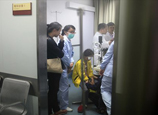
China should improve the quality of growth by cultivating new forces, not by adopting short-term stimulus measures
Some foreign media have predicted that the downward economic momentum will prompt the government to loosen its macroeconomic policies, work out stimulus measures and follow on the heels of other countries by cutting interest rates.
Such a prediction is based on misjudgments about China's ongoing economic conditions and thus is unlikely to come true.
The biggest problem facing China's economy is not a shortage in its monetary supplies, but insufficient effective investment demand. A large volume of money China's central bank has issued over the past years has caused huge fluidity. Statistics indicate that the country's household deposits rose to 41 trillion yuan ($6,683 billion) at the end of 2012, an increase of 27 trillion yuan from the 14 trillion yuan in 2007. Such colossal household deposits, along with huge volumes of financial products issued by domestic financial agencies and a drastic rise in China's local government debt, will cause excessive fluidity if not properly handled. In particular, the quantitative easing policy the US Federal Reserve and central banks in European countries and Japan have raced to adopt has exacerbated global fluidity and exerted growing pressures on China because of the influx of hot money. Under these circumstances, China should make a correct judgment about its economic situation and refrain from using a monetary easing policy to spur economic growth, because any move toward this end will aggravate its huge fluidity and increase its financial risks.
China's economy is neither in a state of crisis nor on the road to a struggling recovery, as the outside world claims. The world's second-largest economy has come to a stage that is distinct from the development stages it has experienced over the past decades. Hence, decision-makers should look at China's economic deceleration over the past year from a new perspective to avoid any misjudgments about its economic situation and thus making wrong decisions.

















 Developer razes historic Guangzhou structures
Developer razes historic Guangzhou structures


![]()
